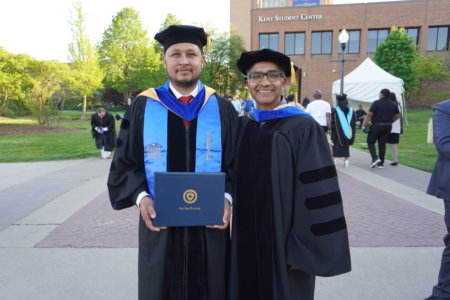
“Knowledge is power” — and the right scientific knowledge in the right hands can, literally, save lives. In rural Kenya, local science communication practices provided a solution to high mortality caused by the delivery of babies by unskilled people. A “baraza,” which translates to community discussion in English, used role-plays to depict the arrival of a mother to a health facility, reactions from health providers, and eventual safe delivery of the baby.
Fast forward to the COVID-19 pandemic. The public experienced an “infodemic,” where misinformation and disinformation became rampant in our digitally connected world, says Jayshree Seth, a corporate scientist and the chief science advocate at 3M company, on the McKinsey Global Institute’s Forward Thinking podcast.
“We clearly saw that when we didn’t have answers, and when the science hadn’t been communicated, and a lot of it was being developed on the go, we had the ‘infodemic,’ because of misinformation and disinformation becoming rampant,” she shares.
The best science communication degrees prepare students to overcome such challenges. As graduates, they can convey complex scientific concepts to a range of audiences and stakeholders — opening avenues for them to make their mark in their community, society, and across the globe. Here are three universities that equip students to do just that:
Australian National University

The Australian National Centre for the Public Awareness of Science at the Australian National University develops methods to encourage informed decisions about big scientific issues. Source: Australian National University
If you want to get science out of its ivory towers, head to the Australian National Centre for the Public Awareness of Science. To be a leader, it’ll benefit you to study at the first science communication centre in Australia. To improve science communication with the public and also among scientists, often an endeavour that transcends cultures, countries, and disciplines, where better than at a centre that’s the most diverse of its kind in the world?
Here, a Master of Science Communication is taught by some of Australia’s leading science communication academics and professionals, paving the way for you to carve successful careers in a wide range of fields. This postgraduate programme is more than just an exercise in understanding and simplifying scientific jargon — it’s a journey for scientists to create greater impact and innovation in their field.
Aspiring leaders will learn how to engage with a wide range of stakeholders, from funders and industry partners to government policymakers and community groups. Problem-solvers will master the art of communicating the meaning of science as a means to a future career as science communicators in media, research organisations and the advocacy sector. You’ll grasp the skills, knowledge and experience to be the go-to expert on how to think about and talk about science.
Want a faster and more flexible option to achieve all of this? The Graduate Certificate in Science Communication is 100% online, spans half a year and is rated #1 in Australia for graduate employability. Whichever programme you choose, you’ll be part of an institution that includes the UNESCO Chair in Science Communication for the Public Good as well as the Responsible Innovation Lab and The Science in Popular Culture and Entertainment Hub.
To learn more about these programmes, click here.
Cornell University

Cornell University houses more than 100 interdisciplinary research organisations, 18 Cornell research centres and two national research centres. Source: Cornell University/Facebook
Cornell University is a leader in research and innovation, renowned for producing highly skilled graduates. Those who study at the College of Arts and Sciences — which houses a range of departments and academic programmes covering the humanities, social sciences, and natural sciences — benefit from a perfect balance of world-class teaching resources and collaborative research communities.
The Centre for Conservation Social Sciences, for example, is a knowledge hub for academics, students, natural resources agency staff, non-governmental organisations, and policymakers to expand their knowledge on the social dimensions of natural resources, environmental management, and policy. Research outcomes — which include empirical data, conceptual frameworks, and theoretical insights — are reported at conferences, in peer-reviewed journals, books, and many more.
For those interested in learning how to use a variety of communication tools to engage the public in the sciences or engineering, the Science Communication and Public Engagement minor will equip students with the know-how to contribute to the public understanding of science.
What’s more, researchers and scholars at Cornell University are driven by curiosity. They often collaborate across disciplines and colleges, partnering with applied scientists and researchers. Beyond this, faculty members work alongside postdocs, graduate and undergraduate students to explore the stars, rural communities, classrooms, and how humans and society affect the world.
The University of Bristol

The University of Bristol is at the cutting edge of global research, which includes innovations in areas ranging from cot death prevention to nanotechnology. Source: The University of Bristol/Facebook
The University of Bristol is ranked fifth for research in the UK (Times Higher Education) with 94% of its research assessed as world-leading or internationally excellent, according to the 2021 Research Excellence Framework. Scientists from this institution have a key voice in an IPCC report highlighting the grave perils posed by human-induced climate change.
In an era where science is at the centre of politics, policy, economics and societal behaviour, the MSc Science Communication for a Better Planet provides training in a wide range of science communication — from working with schools, engaging with the media and briefing politicians to public engagement, event organisation, and natural history filmmaking.
Placements, internships, or expeditions allow students to build an exciting portfolio of creative science communication outputs, including press releases, social media campaigns, briefing documents, and many more. Graduates often add value in sectors like science, journalism, and filmmaking.
Meanwhile, research at the University of Bristol delivers bold answers to big questions. Some examples include projects on developing a unique quantum-enabled gas imaging camera to help dramatically cut environmentally damaging methane leaks from the oil and gas industry.
*Some of the institutions featured in this article are commercial partners of Study International










